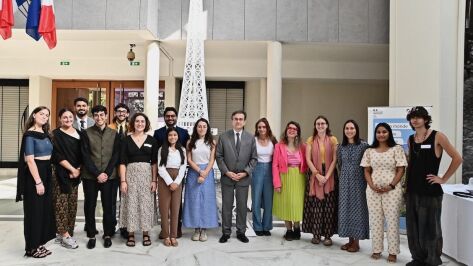 Actualités
Actualités 
Disabled students are more prominent and better supported
The French Ministry of Higher Education released the conclusions of the latest National follow-up committee of Inclusive University that analyzed progress made in terms of inclusion: at the academic start of year 2022, over 59,000 students supported by a disability mission were registered in private and public higher education institutions, representing 2% of all students. This figure was multiplied by 7.7 over the last 20 years.
As part of the objectives set at the National Disability Conference in April 2023, this follow-up meeting was held during a time for consultation with the aim of not only taking stock of the progress made, but also outlining new objectives and other prospects for pursuing this dynamic of inclusion.
Momentum is speeding up
“One of the key mission of higher education and research is to work so any individual may build the future of his or her choice by guaranteeing equal conditions for success in their studies”. So said Sylvie Retailleau, French Minister for Higher Education, to open the meeting and show that the French government is “working hard to achieve this goal”. Retailleau said that the first results are there to be seen and show “a sharp increase in the number of students supported by a disability mission and a diversification of their profiles”.
More specifically, the Ministry reports that at the start of the 2022 academic year, more than 59,000 students benefitting from disability support registered in public and private higher education institutions, representing 2% of all students. The Ministry points out that this trend has “increased significantly since 2017, with the number of students supported doubling in six years, from 29,000 to 59,000”. More than 50% of supported students are registered in Licence study course, with a predominance in the humanities and social sciences, with an increase to be noted in engineering courses. However, more of them are now studying for a Master’s degree (+2.68% since 2018) and in engineering (+2.73% since 2018), “which reflects better support in continuing their studies and a decline in self-censorship”.
Ongoing efforts
The Ministry of Higher Education, in association with the Ministry in charge of disabled people, salutes “the remarkable work of disability missions in individualising responses and coordinating the action of the institution’s services and teaching teams, thereby improving support for students”.
Efforts will therefore “continue to encourage and support the shift towards adapted and accessible models”. They include:
- access to scholarships based on social criteria, which has been made easier for students with disabilities since the start of the 2023 academic year;
- the resources allocated to institutions to improve reception and study conditions, which have risen sharply: they have increased by 50% in the 2024 French law on finance. In three years, these funds have tripled;
- the “Universités Inclusives Démonstratrices” (Inclusive Demonstrator Universities) project, which will take concrete form in the summer of 2024 with the selection of three pilot institutions, and which should make it possible to support establishments “so that they become exemplary in terms of accessibility”.
Emerging support for international mobility
France Universités, the conference representing all French universities, has just signed a partnership agreement with the 100% Handinamique association.
According to the conference, the agreement underlines “the shared desire to make life easier for students with disabilities in higher education institutions”. France Universités and 100% Handinamique have therefore decided to pool their strengths around a number of areas, including:
- labelling student associations trained in the inclusive culture of disability;
- promoting student civic involvement in disability issues;
- supporting students with disabilities in international mobility.
On this last point, that of international mobility, France Universités explains that students with disabilities “sometimes have to forego mobility programmes, even though it is a source of personal fulfilment, cultural enrichment and a professional qualification valued or even required, by some employers”.






Commentaires
Vous devez être connecté pour laisser un commentaire. Connectez-vous.